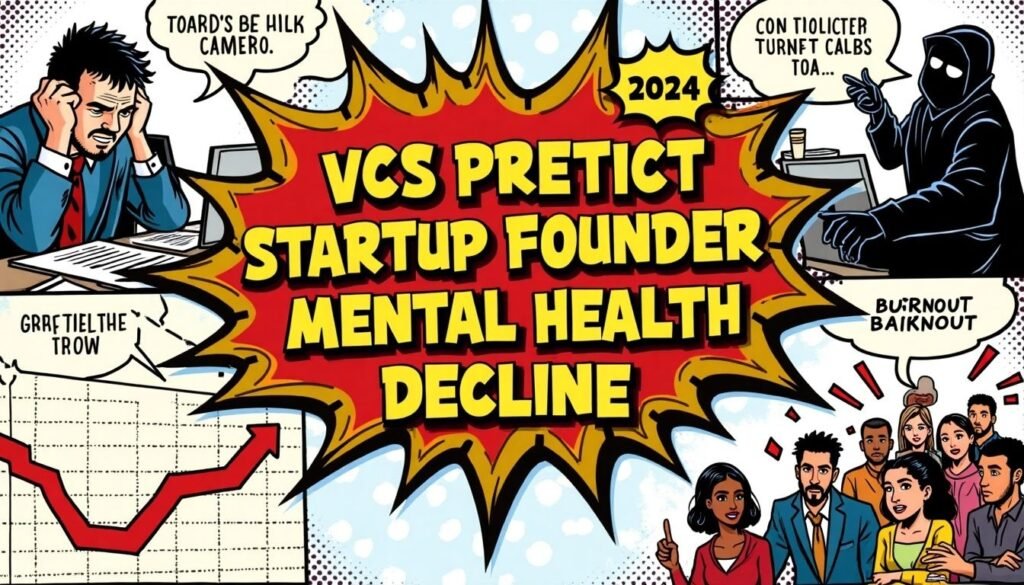Venture capitalists are expressing concerns about a potential decline in the mental health of startup founders as we approach 2024. They believe that the pressures of raising funds, managing teams, and meeting high expectations could become overwhelming for many entrepreneurs. The intense competition within the startup ecosystem is making it harder for founders to cope with stress and maintain a work-life balance. Furthermore, as economic uncertainties linger, there may be increased anxiety around financial stability and business success. Without proper support networks and mental health resources, these innovators might face significant challenges that could impact both their personal well-being and their companies’ futures. It’s vital for the industry to recognize these issues early on, to help prevent burnout and encourage healthier environments for creativity to thrive.
The Reality of Founder Mental Health

Startup founders often find themselves under immense pressure to achieve success, which can lead to significant stress. The nature of their role blurs the line between work and personal life, making it hard to switch off, ultimately leading to burnout. Isolation is another challenge, as founders might feel alone in their struggles, lacking peers who truly understand their unique challenges. Financial uncertainty is a constant companion, adding another layer of stress that can worsen mental health issues.
Despite these challenges, many founders hesitate to seek help due to the stigma surrounding mental health. The fast-paced startup environment often results in sleep deprivation and unhealthy lifestyles, further impacting well-being. Experiencing failure is common and can take a toll on self-esteem, while imposter syndrome fuels self-doubt and anxiety among founders.
It’s not uncommon for founders to neglect their mental health, focusing more on business tasks while ignoring personal well-being. The need to wear multiple hats and juggle various responsibilities can lead to overwhelming workloads. Addressing these mental health challenges requires acknowledging their reality and taking steps to prioritize self-care alongside business growth.
VCs on the Mental Health Frontline

In recent years, venture capitalists have begun to acknowledge the critical importance of mental health for startup founders. Recognizing that a founder’s well-being is deeply intertwined with a startup’s success, some VCs are actively implementing programs to support mental wellness. These initiatives are more than mere gestures; they represent a growing trend where investors are offering mental health resources as a key component of their support. By openly discussing mental health issues, VCs are helping to reduce stigma, fostering an environment where founders feel comfortable addressing their mental health needs.
The role of VCs in this space is multifaceted. They can encourage founders to maintain a healthy work-life balance, providing the necessary support to ensure they don’t burn out under the immense pressure of scaling a startup. Additionally, investors can offer access to networks of mental health professionals, making it easier for founders to seek help when needed. Some VCs are even incorporating mental health checks into their due diligence processes, ensuring that mental wellness is prioritized from the outset of their investment.
Building a culture of mental wellness in startups is becoming a priority for forward-thinking investors. By promoting open communication about mental health, VCs can help build trust with founders, creating a supportive ecosystem where mental health is not an afterthought but a foundational element of startup success. This proactive approach highlights a significant shift in the venture capital landscape, where the mental health of founders is recognized as a crucial factor in driving sustainable growth and innovation.
Key Factors Behind Mental Health Decline

Startup founders face immense pressure to innovate continuously, which can strain their mental health. Without a stable income, financial stress and anxiety become common, adding to their burden. The high expectations from investors and stakeholders only increase this pressure. The competitive nature of the startup ecosystem often leads to constant comparison, exacerbating stress levels. Decision fatigue is another challenge, as founders must make countless choices, often leading to exhaustion. The fear of failure looms large, causing chronic stress and anxiety. Long working hours contribute to burnout, while the lack of social support can make founders feel isolated. The push for rapid growth can result in unsustainable work habits, further impacting well-being. Personal sacrifices, such as missing family time, can lead to feelings of regret and guilt. These factors combined create a challenging environment for maintaining mental health.
Tech Solutions for Founder Well-Being
In the fast-paced world of startups, maintaining mental well-being is crucial for founders. Tech solutions are emerging as valuable allies in this journey. Mental health apps provide accessible support, offering a range of tools for stress management and emotional health. Online therapy platforms, like BetterHelp and Talkspace, grant founders the flexibility to seek professional advice on their own schedules. Wearable technology, such as smartwatches, can track stress levels and physical health, helping founders stay in tune with their bodies.
AI-based tools are also revolutionizing mental health care by offering personalized recommendations based on user data. These insights can be crucial for founders who need tailored strategies to handle stress. Digital platforms foster community building, allowing founders to connect with peers who understand their unique challenges. Services like Slack and Discord can facilitate these connections, creating spaces for shared experiences and mutual support.
Productivity tools, such as Trello and Asana, help manage workloads effectively, reducing stress by organizing tasks and deadlines. Moreover, telehealth services offer convenient access to mental health professionals, making it easier for founders to get help when they need it.
Mindfulness and meditation apps, like Headspace and Calm, encourage mental clarity and relaxation, essential for maintaining focus and resilience. Virtual reality is also stepping into the mental health arena, providing immersive experiences to manage stress in innovative ways. Lastly, data analytics can track mental health trends, helping identify potential risk factors early on. This proactive approach enables founders to take timely action to protect their well-being.
| Tech Solutions | Description |
|---|---|
| Mental health apps | Provide accessible support for founders |
| Online therapy platforms | Offer flexible mental health services |
| Wearable technology | Help founders monitor stress levels and physical health |
| AI-based tools | Provide personalized mental health recommendations |
| Digital platforms | Facilitate peer support and community building |
| Productivity tools | Help manage workloads and reduce stress |
| Telehealth services | Provide convenient access to mental health professionals |
| Mindfulness and meditation apps | Promote mental clarity and relaxation |
| Virtual reality experiences | Offer innovative ways to manage stress |
| Data analytics | Help track mental health trends and identify risk factors |
Future Prospects for Founder Mental Health
The future holds promising prospects for the mental health of startup founders. With increased awareness, there is a growing push towards establishing better mental health support systems. More startups are expected to embed mental health into their company culture, understanding its importance for sustained productivity and innovation. Investors, too, are likely to consider mental health as a crucial factor during evaluations, recognizing that a founder’s well-being can directly impact a startup’s success.
Advancements in technology could lead to more effective mental health solutions, providing founders with accessible and personalized support. Additionally, mental health education and training programs tailored for founders might become more common, equipping them with strategies to manage stress and prevent burnout.
Collaboration between mental health professionals and the startup ecosystem is anticipated to grow, fostering environments where mental well-being is a priority. Policies promoting mental health could become standard, encouraging open conversations and reducing stigma. As startups increasingly integrate mental health metrics into their business performance evaluations, there could be a shift towards a more holistic view of success.
Open discussions about mental health within the startup community are expected to become more frequent, creating a supportive network for founders. Ongoing research could provide new insights into the unique challenges faced by founders, leading to targeted interventions and support systems.
Frequently Asked Questions
1. Why do experts think startup founder mental health might decline in 2024?
Experts believe that the pressure, uncertainty, and fast-paced nature of running a startup can worsen mental health challenges, especially during economic downturns or industry changes.
2. What signs should startup founders look for to know if their mental health is declining?
Founders should watch for signs such as constant stress, burnout, sleep problems, and feeling overwhelmed or anxious without clear reasons.
3. How can startup founders take care of their mental health?
They can prioritize self-care by maintaining a work-life balance, seeking professional help, practicing mindfulness, and connecting with supportive networks.
4. What role do investors play in a founder’s mental health?
Investors can impact founder mental health by setting realistic expectations, providing support and resources, and understanding the pressures founders face in starting and scaling businesses.
5. What are some common challenges startup founders face that affect their mental health?
Common challenges include high stress from financial uncertainties, long working hours, fear of failure, and responsibilities of managing teams and delivering results.
TL;DR Startup founders are expected to face worsening mental health challenges in 2024 due to stress, isolation, and financial uncertainty. VCs are recognizing the importance of mental well-being, implementing support programs, and encouraging open discussions to reduce stigma. Contributing factors include pressure to innovate, lack of stable income, and long working hours. Tech solutions like mental health apps, online therapy, and AI tools offer support, while future prospects highlight growing awareness and prioritization of mental health within the startup ecosystem.

